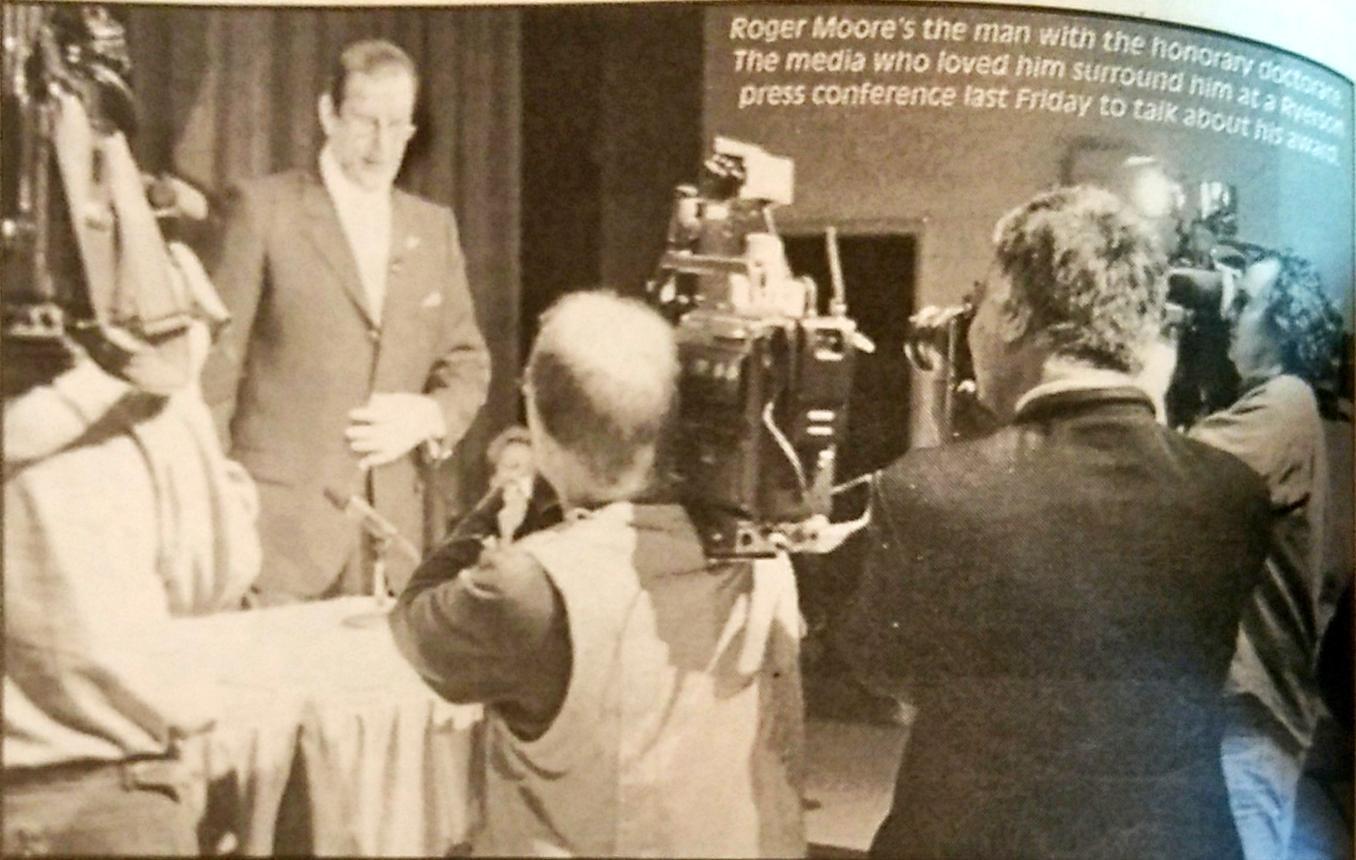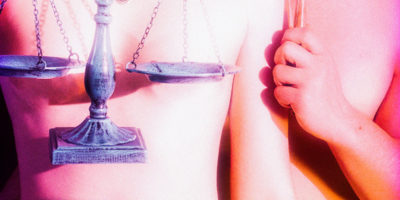By Wojtek Dabrowski
British movie star Roger Moore arrived last Friday to a classroom in Ryerson’s School of Image Arts. The minute the former James Bond star and Ryerson president Claude Lajeunesse enter the room, the camera operators and photographers waiting for a press conference surround them.
Flashes of light and the hum of electricity pierce the room as they sit down to talk about the honorary doctorate of laws Moore is about to receive at convocation ceremonies at 3 p.m.
The camera lights make it feel like a hot summer day instead of a cool October morning. With cameras and tape recorders rolling, more than 20 journalists from Global, CityTV, CBC, CTV, 680 News, Talk 640, The Toronto Sun and Associated Press ask Moore about his films and work with UNICEF.
Lajeunesse presents him with a leather jacket bearing Ryerson’s name and coat of arms. A CityTV reporter asks Moore, famous for his role as secret agent 007 in seven James Bond films, including Live and Let Die, The Spy who Loved Me and The Man With the Golden Gun, who he would dress up as if he was to go trick-or-treating this Halloween. “I would dress up as Doctor Moore from Ryerson,” he said.
Moore is the 33rd recipient of an honorary degree from Ryerson since the school began giving the, out in 1996.
Before then, individuals were awarded the Ryerson Fellowship. The school decided that to reflect its university status and generate publicity, it would instead award honorary degrees to deserving individuals.
Ryerson has since given out honorary doctorates in commerce, engineering, law and letters. The degrees are honorary, so the programs don’t actually have to be taught at the school.
The selection committee looks for people who have made outstanding contributions to society, promoted Canadian culture in arts, science, business, public service and communications, or attained significant achievements with a polytechnic education.
About one-third of Ryerson’s honorary doctorate recipients have donated money personally or hold executive positions in corporations that have donated money to the school.
Bruce Hurley, senior development officer in the university advancement office, handles the gifts Ryerson received from individuals and corporations. He said the honorary degrees can be a from of thanking the recipients for their donations. “Friends of Ryerson who support us with their names also support us with their money for awards.”
While the exact amount of gifts is confidential, many of the honorary degree recipients either own or are executives in corporations that donate in the top bracket of $5,000 or more to the university each year.
For example, Ontario Hydro donates $5,000 or more a year to Ryerson. At convocation ceremonies in June, 1998, Ontario Hydro president Ron Osbourne received an honorary doctorate of laws.
Sam the Record Man owner Sam Sniderman received an honorary commerce degree in 1997. The company has donated more than $5,000 to the university and Sinderman is a member of the Chancellor’s Circle for donating $2,500 or more.
The doctorates have been a source of controversy here and at other schools. Ryerson’s student council was concerned about the lack of student participation in selecting recipients and fought to get a representative onto the committee.
At other Canadian universities, protests followed the choice of several honorary degree recipients.
In November, 1997, about 300 University of Toronto students and faculty protested outside Convocation Hall as former American President George Bush received an honorary doctorate. Bush donated $6.4-million to the university and there was no student involvement in the decision to nominate him for an honorary degree.
Protesters branded Bush’s foreign policy and involvement with the CIA as fascist. Snowballs and chunks of ice were thrown at his bodyguards, the RCMP and Toronto police officers.
A proposal to give an honorary doctorate to Bill Gates sparked protests at the University of Victoria in B.C. The proposal was voted down by the university’s senate after dissenters said they were worried about corporate involvement in their school.
A few hours after Ryerson’s press conference, the same reporters and cameramen watch as Moore addresses the convocation assembly in the Ryerson Theatre, jokingly referring to the 500 graduating students from more than 70 programs as “fellow graduates.”
Half an hour into the ceremony, Moore takes the stage to receive his degree from Ryeson’s new chancellor, John Craig Eaton.
Moore doesn’t use cue cards or notes during his speech to the graduating class, relying instead on wit and personal experience. Wearing a black and red gown, he talks about the importance of helping other to be successful.
“One day you will realize you have two hands. One is for helping yourself and one if for helping others,” he tells the assembly, which responds with a standing ovation at the end of his speech.
Many of that evening’s newscasts and the next day’s papers mention Moore — and Ryerson.
The amount of media coverage Moore’s visit to Ryerson inspired isn’t unprecedented. A search of major Canadian news sources shows that since 1996, more than 70 articles have been written about Ryerson’s honorary doctorate recipients.
Ryerson went out of its way to get James Cameron, director of the Academy Award-winning movie Titanic, to accept an honorary doctorate in 1998. When he was chosen to receive the award and invited to speak at convocation in June, 1998, Cameron notified the university that he wouldn’t be able to attend on the scheduled date.
Instead of naming another recipient, convocation was rescheduled to June 12 to fit Cameron’s timetable, even though the guidelines for giving awards state if a nominee “is unable to be present at the convocation concerned, the president shall approach the next nominee selected by the committee.”
Some students and their families had to rearrange their travel plans to attend their graduation. But just having Cameron here was a coup for Ryerson and its graduates, said former RyeSAC president David Steele. “The tie between Ryerson and a celebrity like James Cameron … helps identify the graduating students in the industry.”
RyeSAC president Erin George agrees, but says honorary doctorate recipients don’t always share the same views as graduating students. She uses last June’s convocation, where an honorary doctorate was given to Jack Granastein, historian and CEO of the Canadian War Museum in Ottawa, as an example.
Granastein’s speech to the graduating community arts and services students was about the importance of Canada’s presence in Kosovo during the NATO bombing campaign.
“Many of those students were participating in demonstrations against this war,” George said, “and here was an individual who celebrated war and who believed it was necessary.”
RyeSAC has tried to get more students on the academic awards and ceremonials committee, which chooses honorary doctorate recipients.
Faculty, staff and students can nominate individuals at least eight months before the convocation where the award will be given. Nominations are then evaluated by the awards committee, which consists of 13 members, including committee chair Lajeunesse, who are appointed by the academic council for one-year terms.
This is the first year a student has been allowed to join the committee. RyeSAC executive assistant Dennis Loney said the selection committee was concerned about confidentiality in allowing a student to join.
There was a belief that a student should not participate in in camera [private] discussions,” Loney said. He met with Kathleen Kwan, secretary of academic council, earlier this year to discuss changing what he thought was unfair.
Loney’s initiative resulted in Danelle Martin, a hospitality student, being given a spot on the awards committee this school year. “It’s a start,” Loney said, even though he’s unsure what impact her presence will have.
Ryerson’s award is Moore’s first honorary degree. As he stands before the media gathered at the morning press conference, he stares down at his Ryerson letter jacket.
“It says doctor,” he says with a mixture of laughter and disbelief. “I’m a doctor — I can’t believe it.”













Leave a Reply